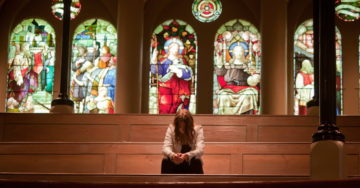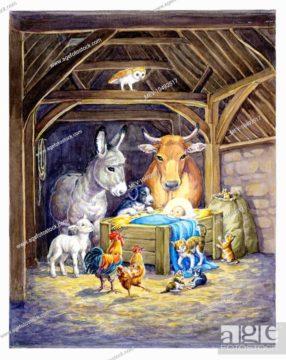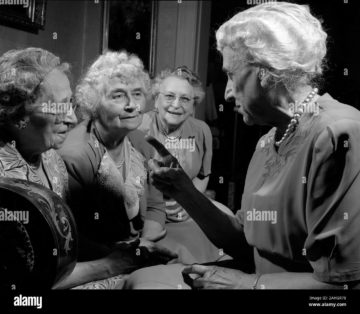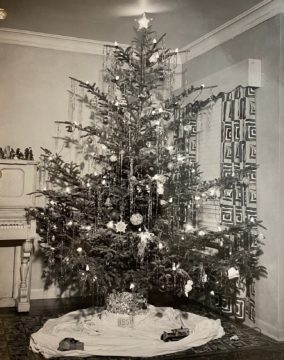by Carol A Westbrook
 One of my earliest memories was of Christmas Eve in 1954. I was about 3 or 4 years old, playing under a table at my grandmother’s house. My sister and a cousin were with me, playing with a small wooden crate filled with straw. The crate represents the manger in the stable in Bethlehem 1,954 years ago, where the animals welcomed the baby Jesus, since there were no rooms in the inn. We three kids were waiting for the adults to come to the table to join us for Wigilia, the traditional Christmas Eve feast, after which we would move to the living room, sing Polish Christmas Carols, and wait for an uncle disguised as Santa to arrive with presents for everyone.
One of my earliest memories was of Christmas Eve in 1954. I was about 3 or 4 years old, playing under a table at my grandmother’s house. My sister and a cousin were with me, playing with a small wooden crate filled with straw. The crate represents the manger in the stable in Bethlehem 1,954 years ago, where the animals welcomed the baby Jesus, since there were no rooms in the inn. We three kids were waiting for the adults to come to the table to join us for Wigilia, the traditional Christmas Eve feast, after which we would move to the living room, sing Polish Christmas Carols, and wait for an uncle disguised as Santa to arrive with presents for everyone.
The wooden crate and the Christmas Eve feast were Polish traditions. This is not surprising since my grandparents were only a few decades away from their life in Poland, when they left the to marry and raise a family in Chicago. Like most of the other folks in our neighborhood, we still had strong ties to Polish customs and religion.
Our Catholic religion was full of magic, which we took for granted. Prayers to St. Anthony would help you find something you lost. Want something really, really bad? Say a novena, for 9 days of prayer. St. Jude can help solve hopeless cases, like cancer. If you were paralyzed or had some other awful condition, you might make a pilgrimage to Lourdes, in hopes of a cure. Many were cured there.
As a child it was hard for me to separate these Catholic beliefs from the Polish customs, because they were all part of the magic of Christmas. And there was no doubt that Christmas was full of magic–after all, our parents did not have the money to give us so many toys and gifts, and on so many different days of the holiday—St. Nicholas Day, Christmas Day, and Three Kings’ Day. Sure, we knew there wasn’t really a Santa bringing presents, but the rest of the Catholic magic—well, you never knew. And there was definitely a bit of magic about Christmas, which persisted well into adulthood, when I had to create Christmas magic for my own children.
Just before leaving for Christmas Eve dinner at Grandma’s house, Mom would put out some bread crumbs for the birds. She said that we had to be kind to the animals on Christmas Eve, because the animals were kind to the Baby Jesus, letting him sleep in their manger and keeping him warm through the dark night. So every year, as a special thank-you gift, Jesus would give the animals the gift of speech. Just for one night, after the clock struck midnight, until the sun rose on Christmas morning. This was Polish folklore, perhaps, but Mom was sure it was true. She heard them herself once, she said.
“Why don’t I hear our pet dogs and cats talk on Christmas?” I asked Mom.
“The house-bred animals have long since forgotten about Jesus,” she answered. “Only wild animals, like the birds and squirrels, remember him, and they are the ones that accept this gift of speech. That’s why I always leave them some food on Christmas Eve. To thank them for taking care of Jesus in the stable.”
How amazing! The birds could talk in the early, dark hours of Christmas morning. I would love to hear what they had to say, and I planned to eavesdrop on them some day. It seemed a natural thing to do. As children, we spent a lot of time eavesdropping on our parents, especially when they were staying up late, sitting in the kitchen visiting with relatives. Pretending we were quietly asleep, we’d take our pillows and lie next to the door that separated our rooms from the kitchen. We listened intently, like the spies we saw on TV. There was the thrill of getting away without being caught. But it was worth the risk to hear some important news. Maybe we’d hear about a murder! Or why the priest left the parish suddenly. Or what our Christmas presents would be. But we never did hear anything important or exciting.
When the adults talked, the conversation went something like this:
“Pass the chips, please. Sure, doc wants me to lay off the salt but I can’t resist.”
“Did you hear about Tony and Mary? They finally got engaged!”
” My rheumatism is acting up. I’m on the heating pad every night.”
“My Doctor is no good, okay if I try yours?”
“Do you know how much she spent for that new coat! It’s outrageous!”
“I heard Joe got a new Plymouth. I went over to his garage to see it last week and it’s a gem. Power steering and everything.”
“Vic is looking for a new job with the City. He’s hoping to keep his pension.”
…and so on. It was so boring!
But listening to the birds… that would be extraordinary! I wonder what they would talk about? The joys of flight? How free it felt to travel? What it was like perching on the highest steeples of the church looking down on the city? Or scenes of foreign lands as they migrated to the South? My imagination soared as I thought about it. I just couldn’t wait to hear them!
One Christmas I decided it was time to find out. My plan was to stay up on Christmas Eve and sit next to the outside door at midnight to listen. If discovered I’d have the perfect excuse: I would say I was waiting for Santa, knowing full well there was no Santa–at least, probably not.
After the Christmas Eve dinner and party at Grandma’s house we four children left with our parents and tucked into bed, excited with anticipation but exhausted from a busy evening. I waited until everyone fell asleep, and no one was stirring in the house. I kept my eye on the clock. Midnight approached. I put on my slippers, grabbed a blanket and pillow, and slid out of bed, careful not to wake my sister. I quietly crept down the hall to the enclosed porch, only a door away from the spot in the yard where Mom had thrown the breadcrumbs. I laid down near the door and listened.
Soon I heard the church bells ringing a joyous tune, as midnight mass had just ended in the nearby church. I could picture the parishioners leave the church, walking through the crunch of snow to their cars or homes. The tune was followed by 12 peals that marked the midnight hour. Then it was quiet again, and I listened. I could imagine the winter birds assemble in our yard, the sparrows, blackbirds, cardinals, and a few remaining robins. I began to hear their chirping, tweeting and cawing.
I could begin to make out the words.
“cheep, cheep…..cheep..cheap..cheap….”
“Squawk…squawk..”
“Cheap, Cheap, Cheap, that’s what this is. Stale bread crusts, not even birdseed.”
“Quit squawking. At least she puts out food for us, the others don’t even bother.”
“My feet are cold.”
“That’s nothing. Mine hurt.”
“Did you hear that the cardinal left his mate and is planning to raise a brood with another mate this spring?”
“Scandalous.”
“You should talk, you change mates every year.”
“Hey, that’s my bread crust!! Give it back or I’ll peck your eyes out.”
“Don’t be a bully, Blackbird.”
“Speaking of that, did you hear about the other blackbird? He had a run-in with a cat.”
“Speaking of cats, you haven’t seen that tabby around here tonight? I’d hate to get surprised by her.”
“No, she’s busy with a bowl of milk someone put out–with cookies for Santa. Ha hah.”
“Speaking of pests, there’s Pigeon hovering. Let’s chase him away before he takes all our food.”
And they flew off, but returned and began again with their incessant noise.
That was it. Gossip, complaining, worthless comments, boring conversation. They were beginning to sound like my chattering, gossiping aunts. They droned on and on.
Someone was shaking me awake. My mother. It was Christmas morning, and my sister and brothers were running into the living room to open their gifts under the tree. I rubbed my eyes.
“Wake up, dear. What are you doing sleeping out here? Waiting for Santa?”
I shook my head. “No, the birds. I heard them speak. They were boring.”
She looked at me, and she knew it was true. It happened to her once, when she was a child, while she still believed in the magic of Christmas. Then she collected herself.
“You must have been dreaming, dear. You fell asleep waiting for Santa.” He was here and left presents for you under the tree.”
And I ran to the tree.
